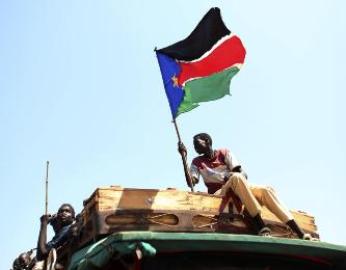99.89% of Abyei’s Ngok Dinka vote to join South Sudan
October 31, 2013 (JUBA) – More than 99% of Abyei’s Ngok Dinka resident have voted in favour of joining South Sudan, according to the committee that organised the unilateral and unofficial vote.

The fate the disputed oil-producing region of Abyei, whose territorial ownership remains contested between Sudan and South Sudan, remains one of the most sensitive and divisive post-secession issues.
A total of 64,775 people registered to vote, out of which 63,433 voted and 362 were deemed invalid, said Biong.
Twenty-nine polling centres were opened during the three-day vote which took place from 27-29 October.
Preparations for the vote first commenced in March, but intensified after the Ngok Dinka paramount chief was killed in May and South Sudanese president Salva Kiir called for the region to be returned to the South.
Civil society organisations, comprising of youth, student, women and faith-based groups, as well as traditional leaders, the teachers’ union and members of the general public played critical role in mobilising the community ahead of the vote.
Although the referendum was conducted without the participation of either Sudan or South Sudan, the organising committee and observers said the process met with international standards and practices.
SHOW OF TRANSPARENCY
Media representatives from local and international news agencies which flew to the region to cover the event were granted full access, apparently to reflect the transparency of the process.
The vote was conducted peacefully, with no security interruptions from the rival Arabs Misseriya nomads reported.
Independent and non-political parties, as well as Christian and Muslim leaders in the region were among those who participated in the vote.
The decision to take unilateral action has attracted concern from regional and international institutions, amid fears it could renew tensions in the area, as well as cause an escalation in tribal conflict.
In a strongly worded statement issued on Monday, the African Union Commission (AUC) condemned the decision, describing it as an “illegal” act.
However, leaders from the Ngok Dinka community said they had been left with little option after the international community failed to intervene and ongoing negotiations between Sudan and South Sudan failed to break the deadlock.
Meanwhile, the Khartoum-aligned Misseriya tribe – who enter the region periodically to graze their cattle – has announced it plans to organise its own referendum in response to the unilateral vote organised by the Ngok Dinka.
A planned referendum on Abyei due to be held simultaneously with that of South Sudan in 2011, failed to take place amid ongoing disagreements between the two countries over who was eligible to participate in the vote.
In a bid to resolve the impasse, the AU mediation team proposed holding a referendum in Abyei this October, stipulating that only the Ngok Dinka permanently residing in the area would be allowed to take part in the plebiscite.
However, Sudan rejected the proposal, saying it ignored the eligibility of the Misseriya and that a public administration and institutions must be established first before any vote can take place.
Last week, the South Sudanese government distanced itself from the planned unilateral vote, questioning what its outcome would achieve if the results were not formally recognised by either country.
Speaking to journalists at a press conference on 20 October, South Sudanese information and broadcasting minister Michael Makuei Lueth stressed that his government had no part in the organisation of the unilateral referendum.
The comments signalled an apparent backflip, with the government earlier expressing its support and solidarity with the people of Abyei.
Both Lueth and the minister for foreign affairs, Barnaba Marial Benjamin, did not respond to Sudan Tribune’s requests for comment on the outcome of the unilateral vote.
(ST)
